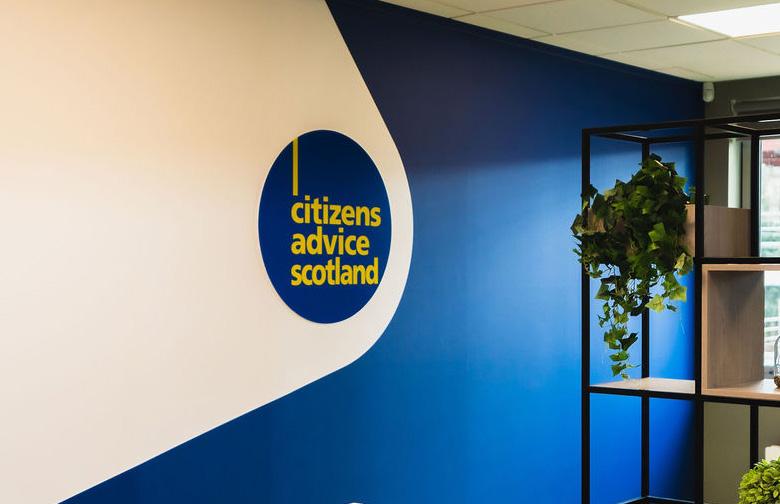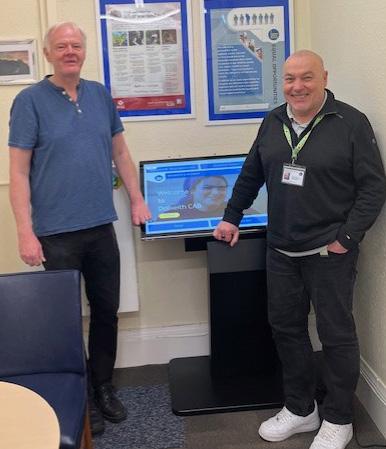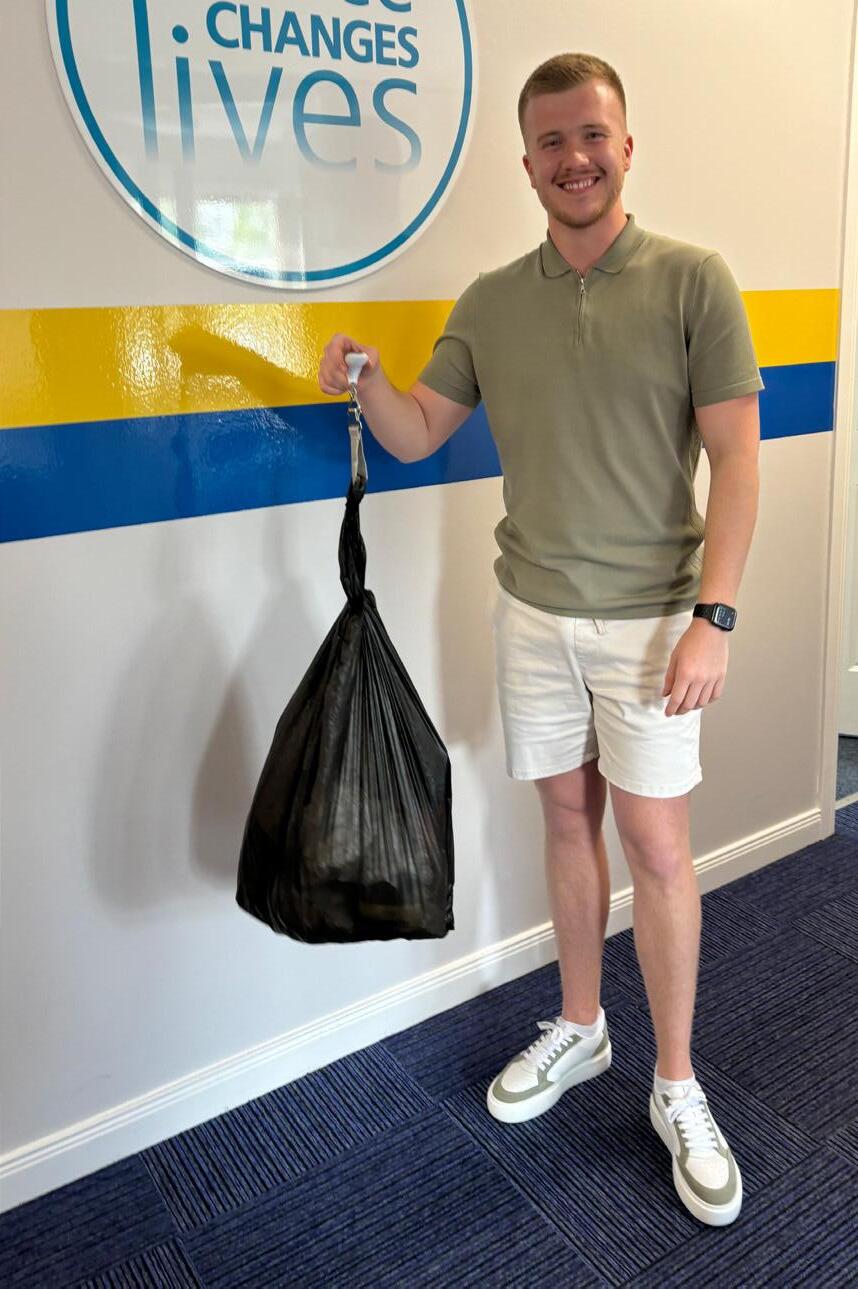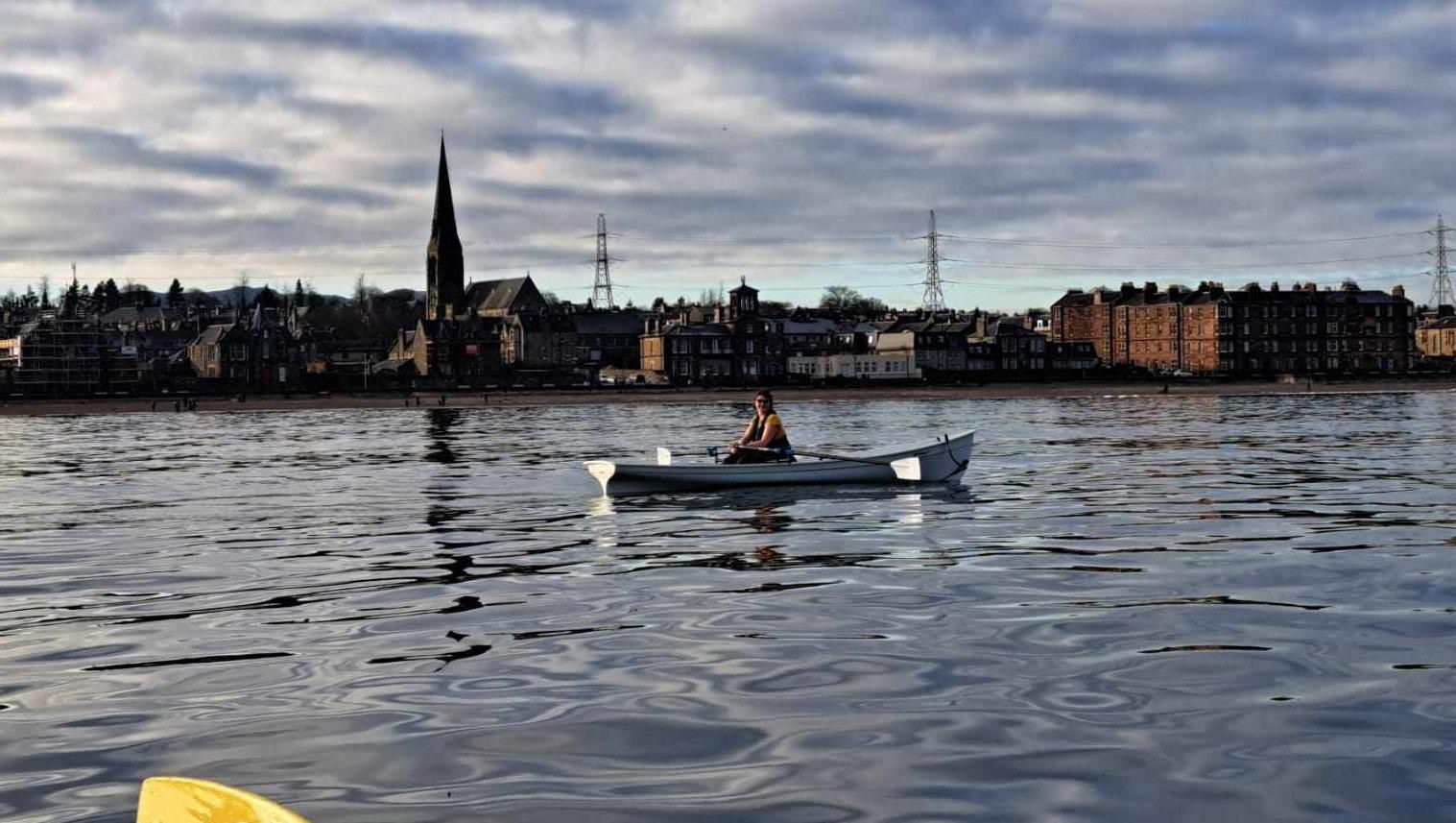Voice
A magazine for the Citizens Advice Network in Scotland

Volunteers’


Volunteers’

Every part of the network wants to be a place where people relish coming to work.
That’s important for paid staff, and arguably even more so for those who volunteer.
Volunteers’ Week is an annual reminder of the good practice that we should be following all year round – listening to volunteers, involving them, striving to make their experience with the network a rewarding one.
Some bureaux (see page 10) are meeting recognised standards for their efforts. Others find less formal ways to value their volunteers. All can look forward to more support from the new central team featured on p4-5.
Volunteers themselves can help too, by spreading the word about what they put into the network and how they benefit.
Restoring the volunteer force to pre-pandemic levels, let alone to the numbers required to fully meet current demand, will be tough. But the task is under way.
Keep in touch at voice@cas.org.uk to respond to articles, suggest new ideas, or share how your bureau or service is innovating to respond to clients’ needs.
Bureaux are getting creative to keep on top of spiralling enquiries from people ensnared in debt.
“Rural poverty is very well hidden in many cases,” says Richard Callaghan.
The money and outreach adviser at Peebles CAB believes campaigns such as the recent Stressed about Debt? drive are especially useful in his area for that reason. It brought the network’s message to isolated people via kiosks, bus ads, radio, press and social media.
Once again, the campaign achieved a high reach. It saw a spike in people consulting our online debt pages – taking some of the heat off advisers. Inevitably, it also drew more people in crisis to the doors of alreadystretched bureaux.
Outlying villages
Richard moved into the money adviser role during the campaign, after the retirement of his predecessor. Combining it with his outreach role, he has found himself offering debt advice in six outlying villages.

The area’s distinctive energy use is one factor. “We have a lot of people on non-regulated fuels, where the costs have gone through the roof,” says
Richard. “People who have oil-fired central heating end up having to pay for a whole tank, so they can quicky get into difficulties.”
Council tax recovery is a common issue too: “The speed with which people can get into trouble, and the speed with which it gets handed over to collection agencies, means debt can whip away from people before they can get hold of it.”
That’s also the experience of Natalia Mendel, money advice manager at Dalkeith CAB.
A member of a forum for money advisers across Scotland, Natalia has heard similar feedback from advisers in other areas: “Council tax is definitely being recovered in a more aggressive way than it was,” she says.
“Besides wage and bank account arrestment, I’ve recently seen goods attachment being used for the first time.”
Another fast-growing issue for Natalia’s clients
4 million people reached by the network’s debt campaign through social media, press and radio
48,517 page views about debt on the website during the campaign
3,745 clients provided with debt advice in that period
£730,000 client gains secured
is clawback of benefits overpayment.
In some cases, clients believe they have advised the relevant authorities of a change in circumstances, but lack of communication between different parts of the DWP means the message hasn’t got through.

Tax credit overpayment is also an issue. “Clients might get a statement to say they owe £8,000 from 18 years ago,” says Natalia. “You can argue the liability for the debts, but it’s very hard to prove – nobody keeps payslips or bank statements for that long.”
There are also a few cases of housing benefit overpayment. As a former benefits adviser, Natalia has knowledge in this area, but newer money advisers have a steep learning curve: “I’m worried that the expertise on challenging this is disappearing.”
With an estimated 50% rise in debt caseload over the past two years, and a corresponding increase in complexity, Dalkeith depends on creative thinking to handle demand.
Natalia works closely with other projects (see page 6) to ensure that clients are fully prepared with documentation and their appointments can be as productive as possible. “We need to look at these issues holistically,” she says.
30% rise in local authority rent arrears advice compared with last year’s campaign period
37% rise in social landlord arrears advice
The spotlight falls on our 1,500-plus volunteer army across Scotland.

The bunting is coming out at West Lothian CAB. Volunteers will be greeted with thank-you banners, posters and success stories on their arrival at the bureau during Volunteers’ Week from June 3-9.
Daily raffles, a group walk round nearby Beecraigs Park on the Sunday, and a volunteer get-together will also be part of the celebrations.
“We always put on an event for volunteers week,” says Susan Proudfoot, volunteer development officer. “We asked the volunteers what they wanted to do this time and they wanted a chance to chat, share stories and get to
know new joiners, so we’ve hired a local venue to host a relaxed event with a buffet and drinks.”
This is far from just a one-week effort. Throughout the year, the bureau runs volunteer satisfaction surveys, one-to-one meetings and monthly get-togethers with volunteer reps to iron out any issues. There are also regular staff-volunteer gatherings over lunch with guest speakers.
This kind of support is essential for retention. Like most bureaux, West Lothian has a constant battle to keep the volunteer pool replenished.
“We have to work at recruitment constantly, as a lot of our volunteers move successfully into employment,” says Susan.
For the first time, Volunteers’ Week celebrations are being supported nationally this year. The newly-established volunteer team at CAS has provided resources to help bureaux gather volunteer stories that will be used on social media and other channels.
The team is also sending out cards and specially-designed thank-you badges for bureaux to present as a token of gratitude to volunteers.
Celebrating and championing volunteers is the starting-point for the network’s volunteer strategy, says Allana Mullen, who joined CAS last year in the new role of volunteer support manager.
“The strategy recognises that there’s been a reduction in volunteer numbers , in line with a national drop,” Allana says. “We’re looking to understand and address this – but we’re starting from a place of strength, with many reasons to celebrate the dedication and commitment of our volunteers.”
Allana is supported by volunteer development officer Catherine Harper, who brings a frontline perspective from her work as a volunteer adviser at Dundee CAB one day a week. Equality development officer Jordan Edwards completes the team, bringing experience and skills from his previous role at LGBT Youth.
Over the next few years, the team will work with bureaux on recruitment and retention, volunteer wellbeing, equality and diversity, and ensuring that all volunteers have the best experience and opportunities.
Find out more about the team's work here https://www.cas.org.uk/bureau-zone/bureauguidance/volunteer-development-team-hub
‘I feel we’re supported and valued a great deal’
During the financial crisis of 2009, David Mitchell found himself in a tight spot.
“We were involved in property. When the market crashed, we couldn’t sell the houses and our cashflow had stopped. It was a difficult time,” he recalls.

When he approached Perth CAB, David learned about a potential solution in the form of the Debt Arrangement Scheme. Despite working in finance, he hadn’t been aware of it.
He is full of gratitude for the support of the adviser he met: “He probably saved us from bankruptcy. It took 10 years, but we managed to pay the whole thing back, and it was a very happy day when that finished.”
When he retired last year, David naturally turned to the network to give his time to help others. He volunteers at the CAB in Angus, where he now lives.
“I really enjoy working there, and the fourhour day passes very quickly,” he says.
“People do work together, including the other volunteers, and the line managers are always available to listen and help with any issues. It’s a refreshing change. I feel we’re supported and valued a great deal.”
Perhaps for that reason, retaining volunteers is not currently an issue for Angus. As with most bureaux, however, recruitment demands constant effort.
“It’s just about finding people with the right skill set,” David believes. “I think there are a lot of the right people out there and who would come forward if they were aware – it’s just reaching out and finding them.”
Every Friday morning, a diverse group of men gather in Midlothian. Over coffee and bacon rolls, they chat and perhaps enjoy a game of snooker or dominos.
This gathering forms the core of UMatter, an initiative set up by Dalkeith CAB.
Vulnerable men are finding support and confidence through a new community.
“When we opened back up after Covid, we realised there were a lot of men who’d become isolated. Some had new caring roles, others had been separated or bereaved, or their mental health had declined,” explains bureau manager Julie Podet.
The bureau put together a successful funding bid. The project, now in its second year, has proved a lifeline for men of all ages.
Leading the weekly group is health and well-being worker John Murphy, who also runs one-to-one sessions and accompanies members to official appointments. “John always describes the project as supporting people who have tripped, and catching them before they fall,” says Julie.
Deputy bureau manager Alan Rooney contributes on the advice side, including visiting group members at home or in settings easier for them.
“Although it’s an advice project, it really helps guys who are perhaps not at the point of being ready to get help,” Julie explains.
“John always describes the project as supporting people who have tripped, and catching them before they fall”
Julie Podet, manager, Dalkeith CAB
Success stories include securing better accommodation to suit three disabled group members. But the Friday ‘roll calls’ remain an important touchpoint.
“We chose Friday because the weekend without support services can be a long time for some people,” Julie explains. “What’s encouraging is the peer element that’s developed: even if John’s on holiday, the group can still run, because the guys are looking after each other.”
Meanwhile Dalkeith is extending its reach further, via a giant, easy-to-use touchscreen. Set up at Mayfield and Easthouses Development Trust, where the bureau runs outreach sessions, it directs people to CAB and other local services.
With Scottish Government funding, Julie commissioned a Midlothian firm to build the screen. A second one will be placed in other locations.
“We’ve been struggling to keep up with the demand for services,” says Julie. “If VERA – which stands for Virtual, Expert, Remote Advice – is a success, we can introduce it in other areas of the community to support our frontline work.”

Deliveries to Citizens Advice and Rights Fife (CARF) are now a little less rapid than before – but that’s a conscious choice by staff and volunteers.
For its stationery needs, among other products, CARF has moved from next-day delivery. Instead, it allows supplier Lyreco to choose a delivery date when its driver is already in the area.
It’s one of many shifts being made by the service to cut its carbon footprint.
“It might seem like a small change, but collectively improving in various areas should make reaching our overall goal more attainable,” says business support officer David Moor, who is leading CARF’s net zero efforts.
Fife is one of four bureau areas working on a carbon accounting exercise, together with Perth and Kinross, Ross and Cromarty, and Edinburgh.
CAS is also participating in the exercise, and has funded consultancy work with specialists Smart Carbon Calculator. The results will be used to support the broader network with action towards net zero.

For CARF, participation was in part a useful way to strengthen relationships with its local authority, which has declared a climate emergency and increasingly requires its partners to focus on carbon efficiency.
“Recognising the need to reduce our carbon footprint and transition to a more environmentally friendly organisation, we’re preparing to work towards achieving a net zero target,” says David.
The consultancy training began in December. Since then, CARF has been working to establish a foundation of data on its carbon footprint, which will allow it to set targets and track progress in future.
It is, as David admits, “a mammoth task”, one that’s inevitably hard to fit in alongside client demands. However, staff and volunteers have proved enthusiastic about contributing.
“People have been involved through staff surveys to work out their commute methods, distance and working from home data,” says David. “Some of the lucky ones have also been helping me to weigh our waste!”
There are three big motivations behind the network’s accelerating action on climate change.
It’s easy to feel overwhelmed in the face of the climate emergency.
Dire scientific warnings land regularly. Increasingly they are paired with evidence in the form of extreme weather events.
But even as we recognise the gravity of the crisis, it can be hard to see how our own actions could make a practical difference.
If that’s true of many people on an individual level, it’s also been the effective position of the network until fairly recently.



Back in 2021, the CAS Board set a target of cutting CAS’s carbon emissions by 75% by 2030. It pledged to encourage and support network members to make a similar commitment.
When the network was surveyed about its priority themes for support and development in 2021, work towards net zero was not on the list.
Net zero was instead linked to the theme of ‘premises’ – reflecting the carbon impact of our buildings.
The bureaux that joined a net zero working group did so largely because they had plans to move premises. They saw potential funding opportunities through carbon reduction schemes.
Since then, however, the group has become more engaged with decarbonisation in its wider sense. That’s been driven by several motivating factors that are increasingly hard to ignore.
Given soaring client demand and chronic capacity issues, it might be hard to devote time and resources to achieving net zero.
“This is a journey and we can’t avoid the biggest threat facing humanity today, so we need to be stepping forward,” says Gavin Lovesey, network services manager.
“It’s not about moral high-grounds. As one of Scotland’s biggest and most respected charities, we have the opportunity to show leadership on this issue,” he says.
“We have a chance to be proactive in supporting change for our network and the clients we serve.”
When the network’s Patient Advice and Support Service (PASS) contract came up for renewal, bidders were obliged to demonstrate their net zero plans.
The working group reviewed the network’s existing sustainability policy and adapted it for the tender process.
The PASS contract was successfully renewed. But this was just the first example of what will become a routine requirement.
“Many funders – nationally and locally – are starting to ask questions about sustainability,” says Gavin.
“They are asking us to show robust net zero action and carbon reduction planning. We see that both at individual bureaux level and for the network as a whole.
“We are already seeing ourselves excluded from funding sources, and have to anticipate that becoming more common.”
While there’s scope to shrink our carbon footprint, many in the network rightly point out that we’re hardly big polluting corporations. As relatively small, lean charitable organisations, our emissions are limited.
“The working group’s feeling is that the greatest power of the network is in its strength in influencing and campaigning,” says Gavin. “They recognise what can be achieved by focusing energy on social policy, and the contribution we can make on two main fronts.”
These are:
• representing the challenges of local communities as they experience the effects of climate change, and the resulting changes in laws and society
• driving market, industrial and government action to deliver a just transition – for instance, revolutionising public transport and active travel.

Every bureau strives to offer a good volunteer experience. Independent validation can provide the proof –but is it worth the effort?
Like many bureaux, Citizens Advice and Rights Fife (CARF) has seen a decline in volunteer numbers. From a pre-pandemic pool of over 100, the organisation now has around 60 volunteers. CARF is keen to keep them in the fold. “For some
time we’ve been going all-out to make people feel valued and make it an enjoyable place to come and volunteer, alongside our recruitment drives,” says Ross Livingstone, learning and development officer.

That work proved a useful foundation when CARF decided to pursue accreditation to the Investing in Volunteers (IiV) quality standard.
“We went through the good, the bad and the ugly, and we were really honest about where we did and didn’t fully meet the criteria”Ross Livingstone, learning and development officer, Citizens Advice and Rights Fife
The team had considered IiV before, but had to balance the work involved against priority client work at a time of soaring demand. Another organisation had suggested that while the award itself was worthwhile, the assessment process might be cumbersome.
However, on contacting Volunteer Scotland –which delivers IiV – Ross learned that process had changed.
“While you do still need to do a fair bit of thinking and writing about your organisation, there’s much less auditing than before, and the providing of evidence is much less onerous,” he says.
CARF set up a working group to consider its evidence under each of the six quality areas (see box opposite).
Honest discussion
“It was a nice, reflective exercise,” Ross says. “We went through the good, the bad and the ugly, and we were really honest about where we did and didn’t fully meet the criteria.”
Appropriately, the group was dominated by a six-strong team of volunteers. In fact, the group’s existence itself was one of the points raised by CARF to prove its inclusive approach.
The writing of the bid was shared by Ross, volunteer Nicola Stewart, and frontline relief adviser Hayley Wilson.
They were aided by their IiV assessor, based at music charity Sistema Scotland. “He was exactly what an assessor should be – honest about things we needed to change, but supportive in finding answers to issues we were struggling with,” says Ross.
In all, it took around a year for CARF to reach the point where it successfully attained IiV. Each bureau will be proudly acquiring its own trophy, and the service plans to celebrate its achievement during Volunteers Week.
David Redpath, CARF CEO, says: “This award is validation of how important volunteers are to us. It recognises our commitment to volunteering and shows CARF to be a great place to volunteer.
“In time, I hope the award can help with increasing our volunteer numbers. The old cliché remains as relevant as ever: volunteers are the lifeblood of our organisation.”
To achieve the Investing in Volunteers award, organisations need to work on six quality areas:
• Vision for volunteering
• Planning for volunteers
• Volunteer inclusion
• Recruiting and welcoming volunteers
• Supporting volunteers
• Valuing and developing volunteers
Smaller organisations can aim for a similar but separate standard, Volunteer Friendly. Throughout the processs, volunteer managers receive professional mentoring, support and advice to help them organise policies and procedures and give them more confidence to deliver a quality volunteer experience.
CARF isn’t the first Scottish bureau to bid for IiV. Stirling CAB has recently achieved its second renewal of accreditation to the standard.
Laura Plumb is embarking on a round-Britain test of endurance –and the network will see the benefit.

Since they caught the rowing bug over a decade ago, Laura Plumb and her family have competed in regattas around the country.
But this summer will see the CAS network services manager push herself to the limits.
On June 1, Laura sets out from Eyemouth on a circuit of mainland Britain – a challenge of over 2000 miles. She and her teammates will row in two-hour shifts, sleeping on board, throughout a voyage that could last six weeks.
In part, the trip is Laura’s response to the Atlantic crossing her husband, Sean, made two years ago.
“I didn’t get asked on that trip and I was really jealous!” she laughs. “But rowing round Britain will be much more interesting than the Atlantic, as well as potentially more treacherous – the weather is more unpredictable and there are more hazards.”
Where most crews row clockwise, this expedition will take the other direction – thus the crew name, CounterNavig8 GB. “Our aim is to get round safely, but if we break any records as we go, we’ll be delighted,” Laura says.
The crew team is female-dominated and led by a 64-year-old: “The tradition of Scottish coastal rowing that I fell in love with in 2010 is an intergenerational sport, with youth teams and people in their 80s taking part, and more than 50% women.”
Laura is using her trip to raise awareness of the little-known fact that CABs are charities, while raising funds for the network. She has a long history with the CAB service, starting as a student volunteer for what was then Maryhill CAB. She later worked in a range of roles at Edinburgh CAB before joining CAS, which is giving her a sabbatical to complete the rowing challenge.
Help us raise the profile of the CAB network as a charity by sharing this fundraising link with your networks and beyond. All money raised will be distributed across all 59 bureaux, using a needsbased assessment, to support advice-giving.
You can follow the progress of Laura’s team – and try to spot her off the Scottish coast – using this tracker.
